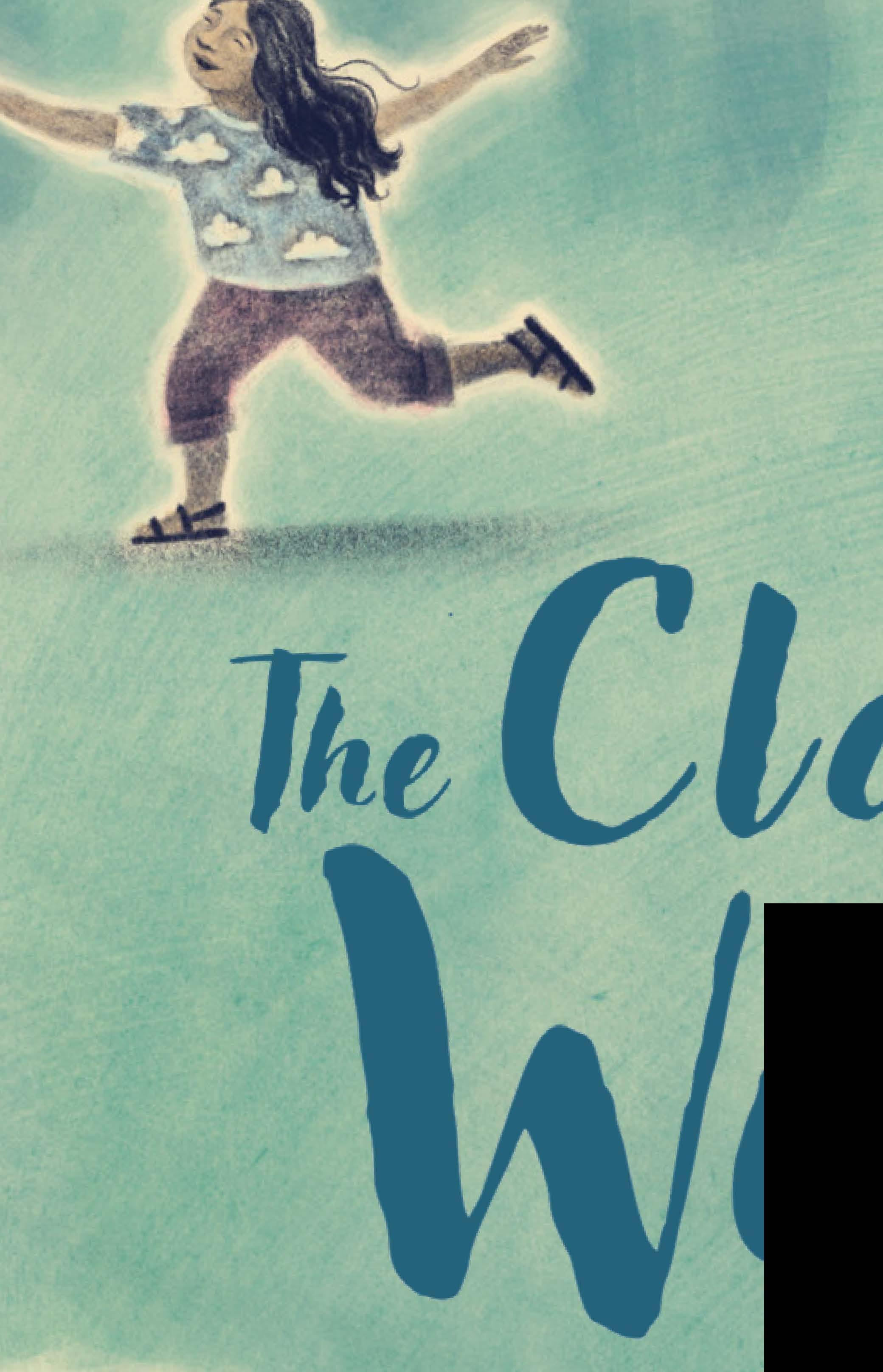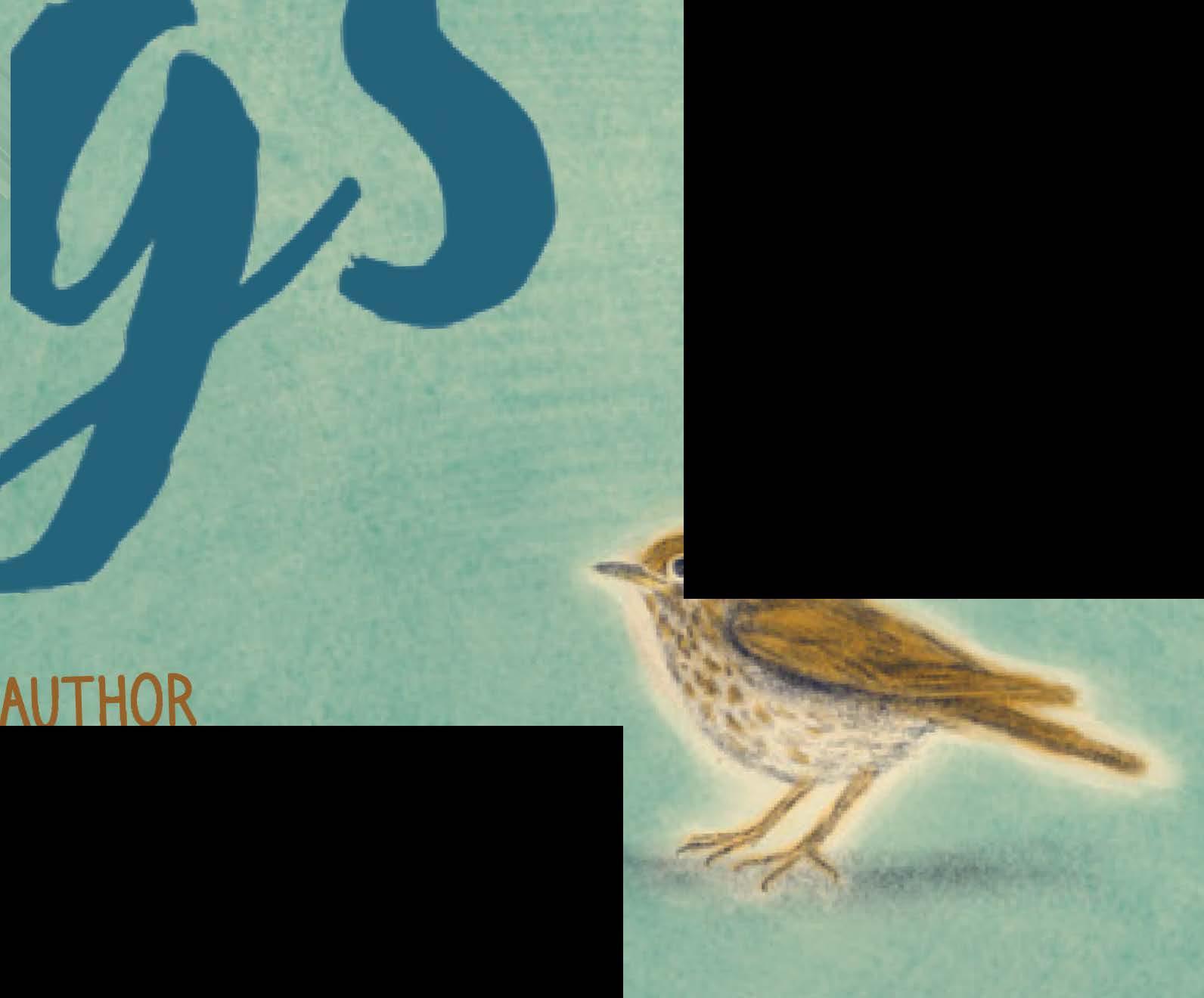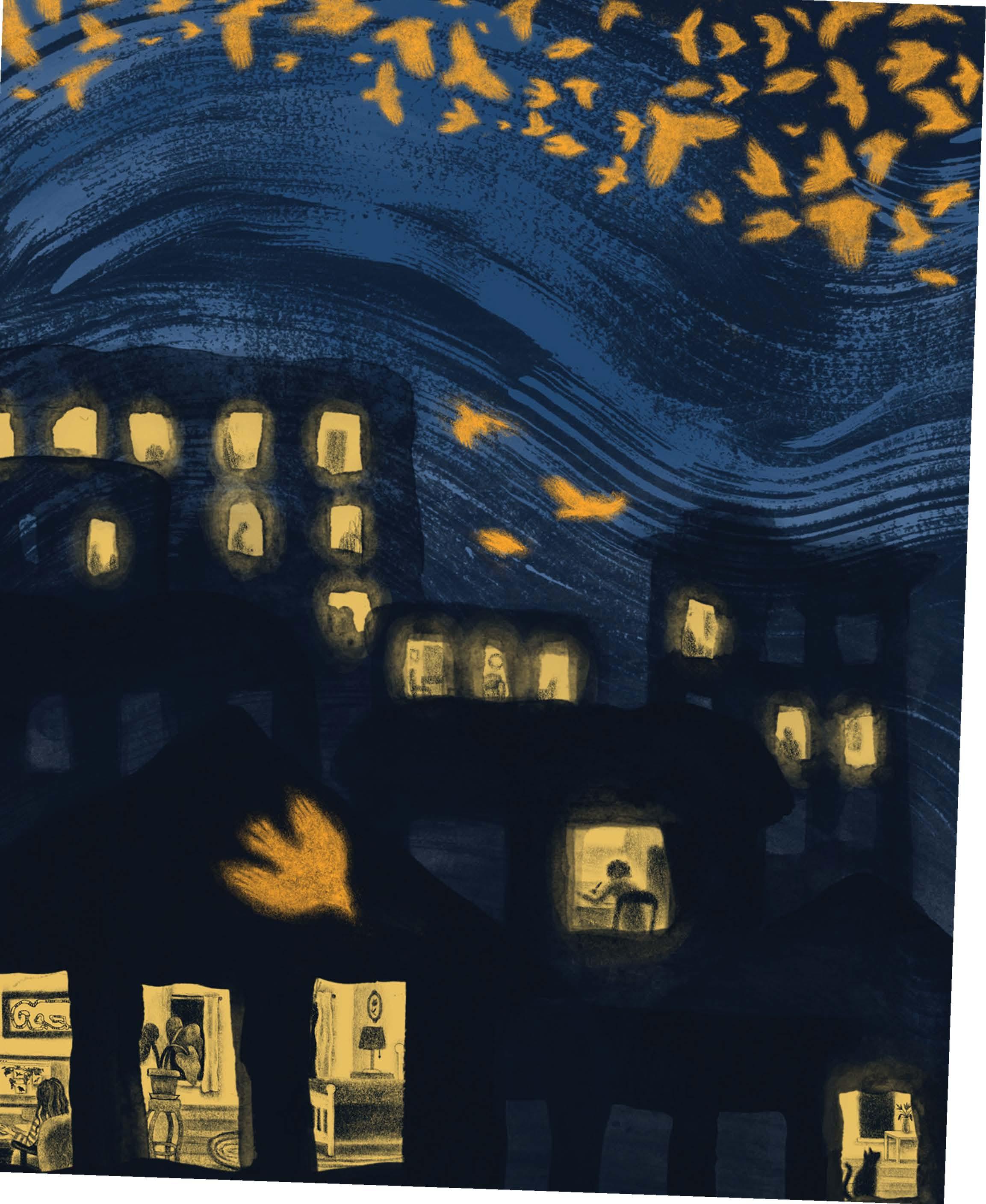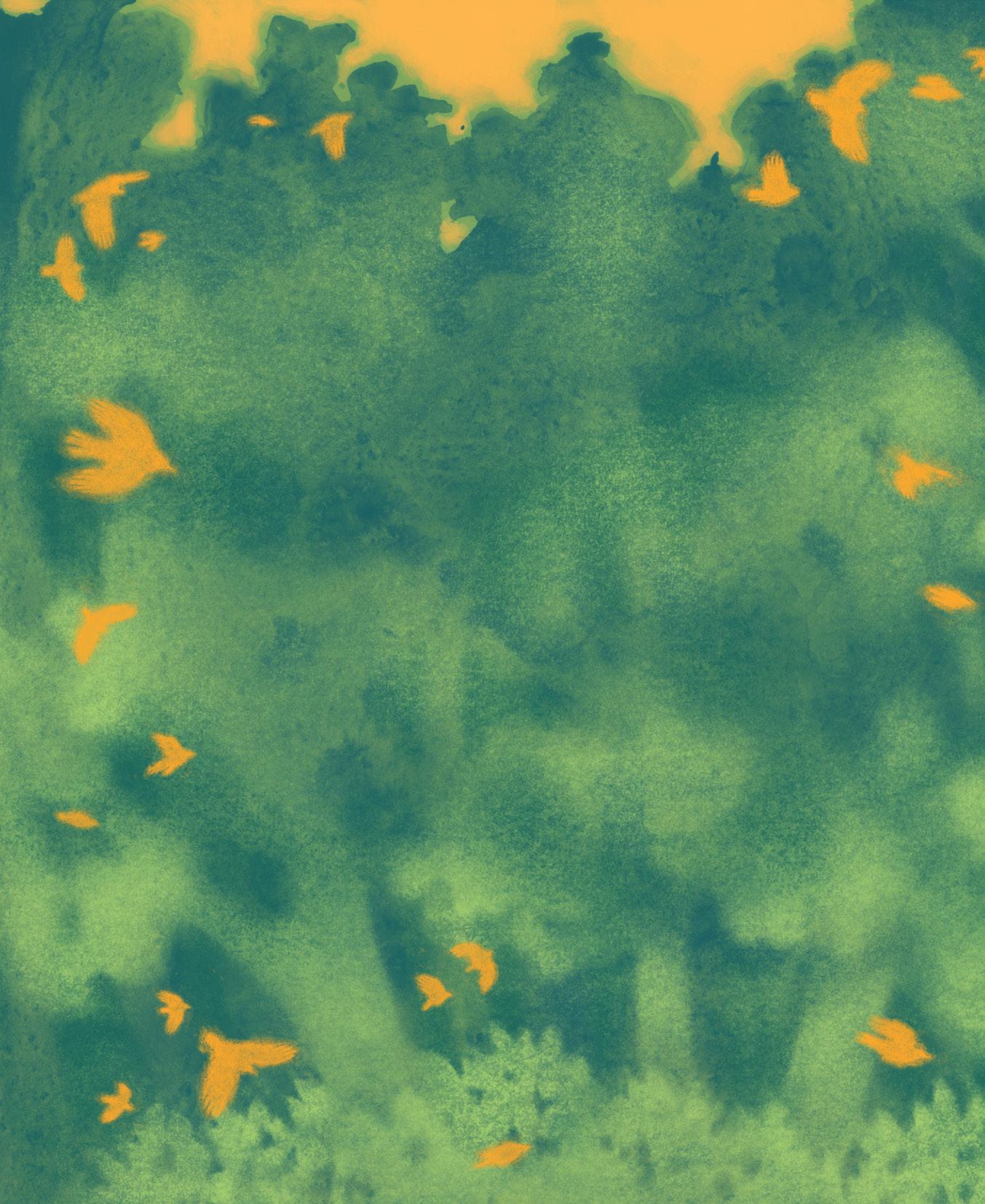







This is an advance, uncorrected proof. Not for resale, duplication, or reposting. Please do not quote without comparison to the finished book.


 BY NEWBERY MEDAL-WINNING AUTHOR PAUL FLEISCHMAN ILLUSTRATED BY HANNAH SALYER
BY NEWBERY MEDAL-WINNING AUTHOR PAUL FLEISCHMAN ILLUSTRATED BY HANNAH SALYER







This is an advance, uncorrected proof. Not for resale, duplication, or reposting. Please do not quote without comparison to the finished book.



This is an advance, uncorrected proof. Not for resale, duplication, or reposting. Please do not quote without comparison to the finished book.

Text © 2024 The Brown-Fleischman Family Trust
Illustrations © 2024 Hannah Salyer
Book design by Melissa Nelson Greenberg
These images were created using gouache, colored pencil, and digital.
This is an advance, uncorrected proof. Not for resale, duplication, or reposting. Please do not quote without comparison to the finished book.
Published in 2024 by Cameron Kids, an imprint of ABRAMS. All rights reserved. No portion of this book may be reproduced, stored in a retrieval system, or transmitted in any form or by any means, mechanical, electronic, photocopying, recording, or otherwise, without written permission from the publisher.
Library of Congress Control Number: 2023947517
ISBN: 978-1-949480-43-6

Cameron Kids books are available at special discounts when purchased in quantity for premiums and promotions as well as fundraising or educational use. Special editions can also be created to specifications. For details, contact specialsales@abramsbooks.com or the address below.


QSS with • ,n
This is an advance, uncorrected proof. Not for resale, duplication, or reposting. Please do not quote without comparison to the finished book.
BYNEWBERYMEDAL-WINNINGAUTHOR PAUL FLEISCHMAN

ILLUSTRATEDBYHAN N A H SALYER

I can’t wait for the clock to tick and reach two-thirty.
Ms. Lee pulls the curtains over the windows. Then she turns off the lights.
She starts the audio of rainforest sounds. We put our heads on our arms and close our eyes.

This is an advance, uncorrected proof. Not for resale, duplication, or reposting. Please do not quote without comparison to the finished book.
This is an advance, uncorrected proof. Not for resale, duplication, or reposting. Please do not quote without comparison to the finished book.


Then we become birds.

This is an advance, uncorrected proof. Not for resale, duplication, or reposting. Please do not quote without comparison to the finished book.
This is an advance, uncorrected proof. Not for resale, duplication, or reposting. Please do not quote without comparison to the finished book.


We’re veeries. Sort of like robins but smaller.

“For months you’ve been in Brazil,” says Ms. Lee. “Lately you’ve been extra hungry. You’ve been gobbling down fruit because it has seeds, and seeds have energy. You’re storing up all you can.”
I’m going to start eating sunflower seeds so I can win the fifty-yard dash.
“It’s April now. Some of you are practicing your song.”
This is an advance, uncorrected proof. Not for resale, duplication, or reposting. Please do not
comparison
Ms. Lee plays a veery song on her phone. The notes go downward and sound like they come from a flute.
quote without
“You feel jumpy and can’t sit still.”
to the finished book.
That’s just what my mom said about me last night.

This is an advance, uncorrected proof. Not for resale, duplication, or reposting. Please do not quote without comparison to the finished book.
“The sun sets. You’d normally pick out a branch to perch on for sleep, but tonight will be different. You’re ready.”
I hear Ms. Lee’s feet getting closer. Then her finger touches my elbow—
—and my arms become wings.

This is an advance, uncorrected proof. Not for resale, duplication, or reposting. Please do not quote without comparison to the finished book.


This is an advance, uncorrected proof. Not for resale, duplication, or reposting. Please do not quote without comparison to the finished book.

“One by one, you burst up through the trees.”
I’m flying!

“Higher and higher. The stars that had been hidden by the forest fill the sky.”
This is an advance, uncorrected proof. Not for resale, duplication, or reposting. Please do not quote without comparison to the finished book.
They help us point north.

This is an advance, uncorrected proof. Not for resale, duplication, or reposting. Please do not quote without comparison to the finished book.

“You’re heading back to the United States and Canada, where you were born. Where it’s easier to catch the huge number of insects you’ll need to raise your own young.”
Other kinds of birds are flying with us.
We call to keep from bumping into each other.
“Because you live near the ground in dark woods, your eyes are large to let in more light. This gives you good night vision.”
This is an advance, uncorrected proof. Not for resale, duplication, or reposting. Please do not quote without comparison to the finished book.
I have big, dark eyes, too.

This is an advance, uncorrected proof. Not for resale, duplication, or reposting. Please do not quote without comparison to the finished book.
“Other birds glide for a while to rest, but you can flap all night without stopping. Your wings are only four inches long, but you’re strong.”

This is an advance, uncorrected proof. Not for resale, duplication, or reposting. Please do not quote without comparison to the finished book.
I’m always the smallest kid in the class. I want to be like a veery.
“On and on you go. When dawn gets close, you start to come down. You need a forest for food and a safe place to rest, but the trees here have all been cut down for farms. You keep flying, then find woods along a stream. Your feet finally touch the ground.”
Then the stupid bell rings.

This is an advance, uncorrected proof. Not for resale, duplication, or reposting. Please do not quote without comparison to the finished book.
This is an advance, uncorrected proof. Not for resale, duplication, or reposting. Please do not quote without comparison to the finished book.



This is an advance, uncorrected proof. Not for resale, duplication, or reposting. Please do not quote without comparison to the finished book.
We’ve gone 168 miles. I get to mark on the map where we’re spending the night.
The next day we study South America’s mountains and rivers. Then Ms. Lee lets us fly.
“You always fly at night when fewer hawks and falcons are around. They’re migrating, too.”
Schoolkids have bullies. Veeries have raptors. Except raptors eat you.
“Look down,” says Ms. Lee. “That’s the Amazon! Miles across, red with the soil from the Andes Mountains.”

This is an advance, uncorrected proof. Not for resale, duplication, or reposting. Please do not quote without comparison to the finished book.

We cross the Orinoco River. We see two jaguars in the moonlight!
This is an advance, uncorrected proof. Not for resale, duplication, or reposting. Please do not quote without comparison to the finished book.
One day when we land, I hear something strange. Ms. Lee’s changed the recording.
It’s the sound of waves. We’ve reached the Caribbean Sea.
“To cross over, you’ll need to replace all the fat you just burned. So you rest for three days, gorging on food.”
This is an advance, uncorrected proof. Not for resale, duplication, or reposting. Please do not quote without comparison to the finished book.

In class, we spend those days studying weather.
When a storm passes through, we look at the flag out the window. The wind changed direction, just like we learned!
“Flying into the wind would make crossing the Caribbean too hard,” says Ms. Lee. “You need a wind from the south.”

My eyes are closed, but I think she’s turned on a little fan. I feel the air on my cheek. Then she touches my elbow.
“Up you go, everyone,” she says. “There’s a storm behind you. It’ll help you fly faster. There’s no place to land, so you have to flap all night, all day, and all night again.”
If my side aches when I’m running, I stop. But the veeries can’t do that.
I peek and see the boy next to me making little circles with his hands.
“You make the long crossing to the island of Cuba in a single flight.”
We measure it on the map. It’s practically a thousand miles!
This is an advance, uncorrected proof. Not for resale, duplication, or reposting. Please do not quote without comparison to the finished book.
“Birds that couldn’t find enough food when they rested don’t have enough energy and fall out of the sky.”
Two days later comes another flight over water. Seven hundred miles over the Gulf of Mexico.
“When you touch down this time,” says Ms. Lee, “you’re in Louisiana.”
People who spot us can’t see our life in Brazil or our long flights.

I wonder what my grandmother’s life was like in Vietnam. Was her trip here dangerous? This is an advance, uncorrected proof. Not for resale, duplication, or reposting. Please do not quote without comparison to the finished book.
“You’re strangers here. You try to stay close to the local birds because they know the dangers. When one gives an alarm call, you hide in a bush.”
Suddenly, Ms. Lee tells us that someone’s dogs are chasing us.
“The energy it takes to fly away from the dogs is energy you needed to keep flying north. You’ll have to replace it by spending extra time finding food.”

This is an advance, uncorrected proof. Not for resale, duplication, or reposting. Please do not quote without comparison to the finished book.
I’ve never thought about it that way. I need to explain this to my dad, since we have dogs.
This is an advance, uncorrected proof. Not for resale, duplication, or reposting. Please do not quote without comparison to the finished book.



“You’ve still got a long way to go. It’s twelve hundred miles up the Mississippi River from Louisiana to Wisconsin.”
Ms. Lee shows us a website where people all over the world list the birds they’ve just seen.
This is an advance, uncorrected proof. Not for resale, duplication, or reposting. Please do not quote without comparison to the finished book.
A bunch of people in Louisiana saw veeries yesterday. That’s us!
“You’re moving north with millions of other birds. Since you travel at night, most people don’t know there’s a bird river over their heads.”
But if you live somewhere quiet, Ms. Lee says you might hear the birds calling.
“You’re attracted to light. But be careful not to crash into lit-up windows. Some kind people are working to get cities to have fewer lights on in big buildings when migration is at its peak.”
People see us in Arkansas. Then Missouri and Illinois.
Then, finally, we’re back in Wisconsin!
“You only weigh an ounce, the same as a pen, but you’ve flown over three thousand miles. Veery impressive!”
To celebrate, Ms. Lee has set up a field trip to a state park.
She passes out binoculars and foldout guides to local birds.

This is an advance, uncorrected proof. Not for resale, duplication, or reposting. Please do not quote without comparison to the finished book.
This is an advance, uncorrected proof. Not for resale, duplication, or reposting. Please do not quote without comparison to the finished book.

Fields have different birds than forests. Some live high up and others down low.
We’re near a creek when I hear a bird sing. Its notes sound like they’re going down a spiral staircase. I look ahead on the trail—and there it is. Hopping on the ground. Just like we’d learned. It flips over a leaf, looking for bugs. Its wings really are the color of cinnamon.

This is an advance, uncorrected proof. Not for resale, duplication, or reposting. Please do not quote without comparison to the finished book.
This is an advance, uncorrected proof. Not for resale, duplication, or reposting. Please do not quote without comparison to the finished book.

I can’t believe that I’m seeing something that has seen jaguars and heard monkeys.
This is an advance, uncorrected proof. Not for resale, duplication, or reposting. Please do not quote without comparison to the finished book.

Then it turns its head. And its big, black eye looks right into mine.
This is an advance, uncorrected proof. Not for resale, duplication, or reposting. Please do not quote without comparison to the finished book.

I think it knows I’m a veery, too.

LEARNING THE LOCALS
Want to follow birds like Ms. Lee’s class? The first step is to find out which birds live where you do. If you know a bird’s name, you can find out where it travels, when in the year to look for it, and much more. A pair of binoculars and the resources below will launch new birders, both young and old.
• Annette LeBlanc Cate, Look Up! Bird-Watching in Your Own Backyard (Somerville, MA: Candlewick Press, 2013).
• Scott Weidensaul, National Audubon Society First Field Guide to Birds (New York: Chanticleer Press, 1998).
• Phone applications: Merlin Bird ID, Audubon Bird Guide, Sibley Birds
• Websites: audubon.org, birds.cornell.edu
TRACKING MIGRATIONS
Birds that migrate are usually searching for food. They can be found in all fifty states, especially in the northern US and Canada, where summer days are much longer than they are closer to the equator. This fuels an explosion in insect numbers that brings many birds north. Since most birds need light to look for bugs, longer days also give them more hours to find food.
Here’s how to follow a bird species on its journey:
• Go to the eBird website, ebird.org.
• Use the Explore tab to enter the bird’s name and then narrow your search to a region on the bird’s route.
• Look for red pins on the map, which show where it’s been seen most recently. If you check regularly, you can follow the bird’s progress.
This is an advance, uncorrected proof. Not for resale, duplication, or reposting. Please do not quote without comparison to the finished book.
Birders thirteen and older can post their sightings on eBird. Younger birders can do so through a group account managed by someone older. The website will teach you how to submit what you’ve seen. Once you’ve got it down, you’ll be adding your data to one of the world’s largest citizen-science projects.

THE REST OF THE STORY
Not all veeries take the route that Ms. Lee’s birds did. Many end their journeys in other states or in Canada. But no matter their path, migration isn’t the end of their story but the lead-up to the main event: raising young. You can track this in your own neighborhood as well.
• Look and listen for birds singing loudly in spring. These are usually males announcing their claims to their territories—pieces of land with enough insects to raise a family.
• If you see birds carrying leaves or stems in their beaks, you’ll know that pairs have formed and nests are being built.
• Once eggs are laid, they must be kept warm to develop. If you spot a bird in a nest, it’s probably sitting on eggs to warm them. Stay back to avoid scaring it off its nest.
• The high voices of chicks asking for food and an increase in activity will tell you that the eggs have hatched. Veeries need to find more than a thousand insects a day to keep their young fed. That means a lot of trips back and forth to the nest.
• Until they can fly, chicks can’t escape from predators. If you hear a bird’s alarm call—usually short, loud, and repeated—it’s probably coming from a parent trying to frighten off a threat.
• A stub-tailed chick on the ground has graduated from the nest but will still be fed by the parents for a time. Eventually, it’ll learn to find its own food. If it migrates, it’ll leave in late summer or fall—and be back again in spring.
HOW TO HELP BIRDS
This is an advance, uncorrected proof. Not for resale, duplication, or reposting. Please do not quote without comparison to the finished book.
Birds have been around for millions of years. Suddenly, they’ve found themselves in a changed world—one with cities and farms, house cats and window glass. You and your families can make their lives easier.
• If you have a cat, keep it indoors or give it a catio.
• Putting decals on windows will cut down on collisions. See abcbirds.org.
• Keep dogs leashed.
• Support your local insects! They’re rarely found on plants that come from other continents, which are often planted around houses and schools. Planting native trees and shrubs will bring back both bugs and birds.


This is an advance, uncorrected proof. Not for resale, duplication, or reposting. Please do not quote without comparison to the finished book.


This is an advance, uncorrected proof. Not for resale, duplication, or reposting. Please do not quote without comparison to the finished book.


